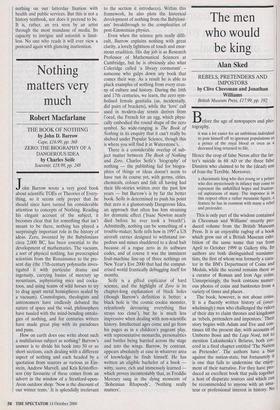Nothing matters very much
Robert Macfarlane
J ohn Barrow wrote a very good book about scientific TOEs or Theories of Every- thing, so it seems only proper that he should since have turned his considerable attention to concepts of Nothing. Reading his elegant account of the subject, it becomes clear that for something that isn't meant to be there, nothing has played a surprisingly important role in the history of ideas. Zero, invented by the Babylonians circa 2,000 BC, has been essential to the development of mathematics. The vacuum, a sort of physical nothing, has preoccupied scientists from the Renaissance to the pre- sent day (the 17th-century polymaths inves- tigated it with particular drama and ingenuity, carrying basins of mercury up mountains, asphyxiating mice and cocka- toos, and using teams of wild horses to try to drag apart metal hemispheres sealed by a vacuum). Cosmologists, theologists and astronomers have endlessly debated the nature of space and the void, philosophers have tussled with the mind-bending ontolo- gies of nothing, and for centuries writers have made great play with its paradoxes and puns.
How on earth does one write about such a multifarious subject as nothing? Barrow's answer is to divide his book into 50 or so short sections, each dealing with a different aspect of nothing and each headed by a quotation from sources as various as Ein- stein, Andrew Marvell, and Kris Kristoffer- son (my favourite of these comes from an advert in the window of a Stratford-upon- Avon outdoor shop: 'Now is the discount of our winter tents.' It is splendidly irrelevant to the section it introduces). Within this framework, he also plots the historical development of nothing from the Babyloni- ans' breakthrough to the complexities of post-Einsteinian physics.
Even when the science gets really diffi- cult, Barrow explains nothing with great clarity, a lovely lightness of touch and enor- mous erudition. His day job is as Research Professor of Mathematical Sciences at Cambridge, but he is obviously also what Coleridge called 'a library cormorant' someone who gulps down any book that comes their way. As a result he is able to pluck examples of nothing from every cran- ny of culture and history. During the 16th and 17th centuries, we learn, the zero sym- bolised female genitalia (as, incidentally, did pairs of brackets), while the 'love' call used in modern-day tennis derives from l'oeuf, the French for an egg, which physi- cally embodied the round shape of the zero symbol. So wide-ranging is The Book of Nothing in its enquiry that it can't really be shelved under Popular Science, though this is where you will find it in Waterstone's.
There is a considerable overlap of sub- ject matter between The Book of Nothing and Zero, Charles Seife's 'biography' of nothing — the publishing fad for biogra- phies of things or ideas doesn't seem to have run its course yet, with germs, cities, chemicals, colours and fish all having had their life-stories written over the past few years — but Barrow's is by far the better book. Seife is determined to push his point that zero is a glamorously Dangerous Idea, an approach that often has him straining for dramatic effect (Isaac Newton nearly died before he ever took a breath!'). Admittedly, nothing can be something of a trouble-maker; Seife tells how in 1997 a US aircraft carrier designed to withstand tor- pedoes and mines shuddered to a dead halt because of a rogue zero in its software codes, and of course it was the imminent fruit-machine line-up of three nothings on New Year's Eve 2000 that had the comput- erised world frantically debugging itself for months.
Seife is a gifted explicator of hard science, and the highlight of Zero is its chapter-long explanation of black holes (though Barrow's definition is better: a black hole is 'the cosmic cookie monster, relentlessly devouring everything that strays too close'), but he is much less impressive when dealing with non-scientific history. Intellectual ages come and go from his pages as in a children's pageant play, with representative monarchs, personalities and battles being hurried across the stage and into the wings. Barrow, by contrast, appears absolutely at ease in whatever area of knowledge he finds himself. He has written an eligible bachelor of a book witty, suave, rich and immensely learned which proves incontestably that, as Freddie Mercury sang in the dying moments of `Bohemian Rhapsody', 'Nothing really matters'.


















































































 Previous page
Previous page